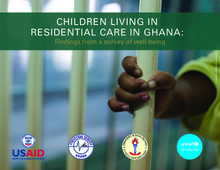Children living in institutional care are more likely than their family-based peers to experience abuse, neglect, exploitation, lack of stimulation, poor nutrition and toxic stress.
Accurate figures on the number and characteristics of these vulnerable children in Ghana were lacking. A census of residential care facilities and an enumeration of the child population in these facilities were undertaken to address this gap, followed by a survey on a representative sample of such population. This was the most comprehensive data collection effort ever conducted on children in residential care. The report, produced by the Department of Social Welfare and Ghana Statistical Service with UNICEF support, provides an overview of the main findings:
- A total of 3,530 children were found to be living in the 139 residential homes that operate in the country. Only about one-third of these homes were found to have a valid licence;
- More than half of children are reportedly exposed to violent forms of discipline;
- Forty per cent of children under age 5 in such homes are moderately or severely stunted;
- Only one-third of children have foundational reading skills, while a much lower proportion have foundational numeracy skills;
- Close to 1 in 4 children do not receive any stimulation or responsive care;
- One in five adolescents were involved in a physical fight inside the residential home.

